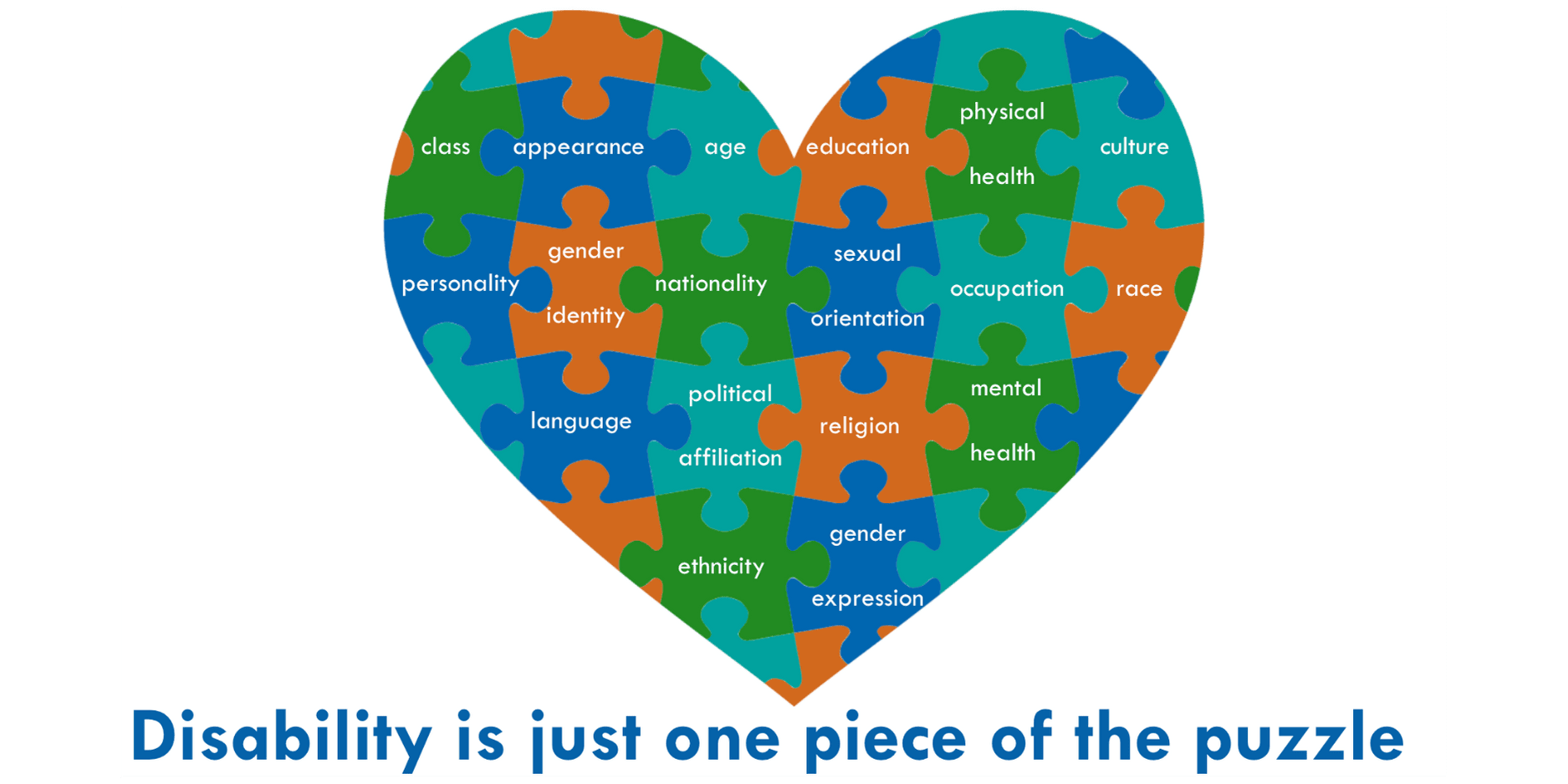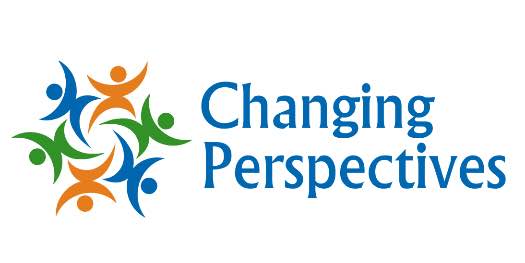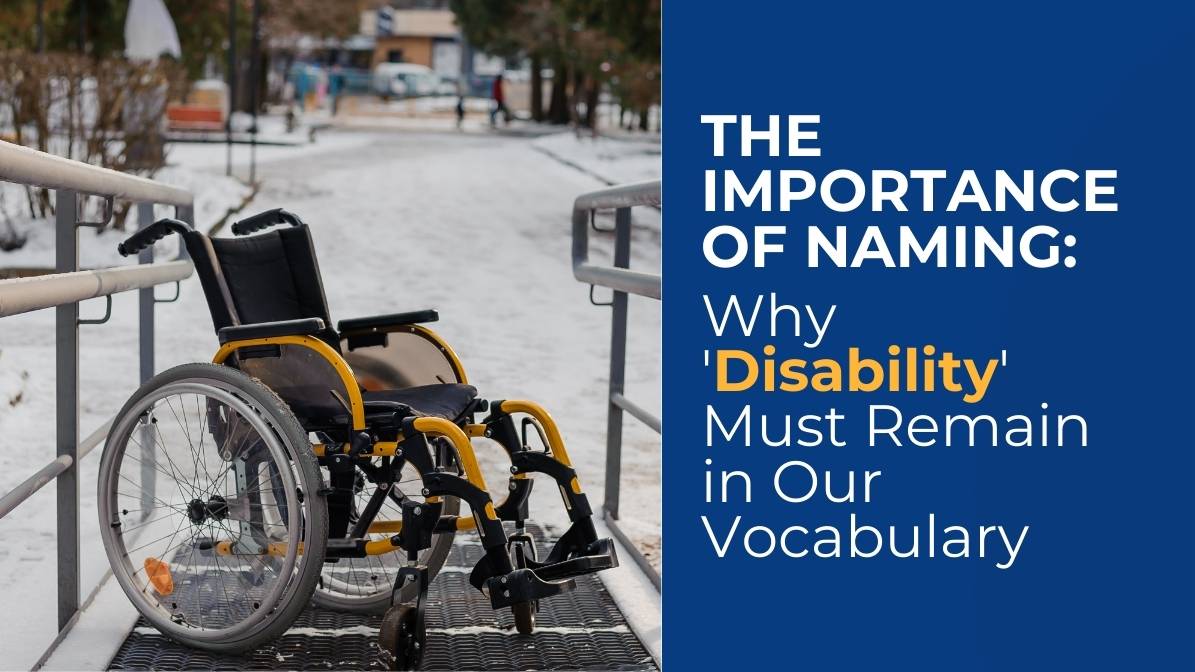Changing Perspectives Executive Director Sam Drazin often speaks about how each of us has an identity puzzle—a collection of unique pieces that together represent who we are. We are made up of puzzle pieces, each representing a component of our identity. Recent political agendas to eliminate diversity, equity, and inclusion initiatives threaten the human existence of celebrating our unique and intersectional identities. In particular, efforts to discourage or erase disability-related language strike at the heart of identity and belonging. Disguised as a push for neutrality, these efforts ultimately strip people of the ability to name and celebrate who they are.
When we stop using terms such as disability, we risk dismantling critical legal safeguards and dehumanizing people by erasing a key part of their identity. Disability is a vital form of diversity, equity, and inclusive practices must remain central when supporting ALL people. Framing the removal of identity-affirming language as neutrality is misleading—it actively undermines access to support, the ability to assert one’s rights, and the right to be recognized.

How Language Shapes Policy and Access
Consider the ongoing efforts to weaken or eliminate key frameworks such as the Individuals with Disabilities Education Act (IDEA) and Section 504 of the Rehabilitation Act. These laws provide crucial protections and accommodations for individuals with disabilities. However, when government entities restrict the use of words like “disability” and diminish their legal standing, it sets off a chain reaction. Without explicit language acknowledging disabilities, securing necessary services such as occupational therapy, physical therapy, and educational accommodations becomes significantly more difficult, especially for individuals whose experiences are shaped by the intersection of disability with race, gender, socioeconomic status, or other aspects of identity.
Language shapes policy, and removing it does not erase the need; it only deepens barriers and fuels marginalization. While these shifts may appear abstract at the surface, the ripple effects over time have tangible real-world consequences for the students, employees, and families who rely on these protections to thrive in daily life.
Why Naming Disability Matters
When we do not name disability explicitly, the consequences affect nearly every part of life—from access to support and services to how people see themselves and how they are viewed by others. At the heart of this issue is a tension between two perspectives: the medical model and the social model of disability.
To better understand this distinction, here’s a side-by-side comparison:
| Medical Model | Social Model |
|---|---|
| Focuses on diagnosis, treatment, and “fixing” the individual. | Focuses on changing the environment to remove barriers and promote inclusion. |
| The individual is expected to adapt to society. | Society is expected to adapt to be more accessible and inclusive. |
| Solutions emphasize medical intervention, rehabilitation, or normalization. | Solutions emphasize accessibility, universal design, and systemic change. |
| Can lead to defining people by their impairments or what they "lack." | Emphasizes people’s rights, identities, strengths, and lived experiences. |
| Example: A person with a mobility impairment is encouraged to improve physical functioning. | Example: A building adds ramps and elevators so people with mobility needs can access all areas. |
| Disability is seen as an individual limitation or personal tragedy. | Disability is seen as a natural part of human diversity; exclusion results from societal barriers. |
When we do not acknowledge disability, we reinforce the medical model and maintain the ableist notion that those without disabilities are the standard. Naming disability isn’t just about language—it’s about recognizing people’s identities, making space for belonging, and affirming the right to be included.
The Impacts:
- Loss of Legal Protections – Without clear language, laws like the ADA, IDEA, and Section 504 become more challenging to enforce, and institutions can more easily deny accommodations and avoid accountability.
- Barriers to Essential Services – Removing disability-related language undermines access to vital services such as occupational therapy, speech therapy, and special education. These barriers reflect ableism, not individual limitations.
- Invisibility and Exclusion – When disability is absent from policy and discourse, people with disabilities are excluded. Their needs and experiences are ignored, and their contributions are erased. This is especially concerning given that more than 28% of adults in the United States live with some form of disability, making them one of the largest marginalized groups in the country.
- Stigma and Internalized Shame – Without affirming language, the dominant message becomes that disability is something to be hidden or “fixed”—a belief rooted in the medical model of disability. Over time, this reinforces ableism—the idea that people without disabilities are the standard and everyone else must conform. As a result, many people—especially young people—internalize these messages, leading to shame, isolation, and silence.
- Erosion of Identity and Community – Disability is not just a diagnosis—it’s a community, a culture, and a history of resistance. Without the language to claim it, people lose connection and the power that comes with shared identity.
A Step Backward in Disability Rights
Suppressing identity-affirming language is not a neutral policy shift—it represents a significant step backward in the progress made by the disability rights movement. Efforts to soften or remove the language that names people with disabilities threaten to undo that work by making rights harder to access and enforce.
One recent example is the removal of several ADA compliance guidance documents for businesses from the ADA.gov website. These resources explained how retail companies are required to have accessible features as well as hotel customer service practices for guests with disabilities. While the ADA itself remains unchanged, the absence of these materials may limit how rights are understood, communicated, and upheld.
The Department of Justice has stated that it will focus on promoting tax incentives to help businesses improve accessibility. While financial support is important, it does not replace the need for clear guidelines outlining the rights and responsibilities of individuals and companies.
Naming is Recognition
Naming the components of our identity is a powerful act. It is how we recognize, validate, and celebrate disability as a meaningful part of our identity. In doing so, we also celebrate diversity and acknowledge that it is not something to be hidden but something to be seen, respected, and included.
The word disability is not just a label; it is a bridge to rights, resources, and representation. Denying people the language to describe their identity erases them from public consciousness and weakens the systems meant to protect them. When that language is stripped from our laws, policies, and everyday conversations, we dismantle decades of progress.
Embracing disability as part of one’s identity is a deeply personal process, shaped not only by lived experience but by the messages we receive from society. When disability is consistently treated as something negative or shameful, it becomes harder for individuals to feel confident in who they are. Representation and the freedom to name disability are critical in helping people build a positive sense of self.
Culture, Perception, and Belonging
Beyond legal protections, there is a broader cultural consequence. When we discourage the use of identity-affirming language, we begin the process of dehumanization. Language shapes how people view themselves—and, in turn, how we interact with others. If we discourage naming disability, we deny the existence and unique experiences of individuals with disabilities.
This has real impacts, especially in education, where naming an identity directly influences access to services and accommodations. Without clear, affirming language, people with disabilities are more easily denied support—or not recognized at all. Personal storytelling can serve as a powerful tool in shifting these perceptions. When people with disabilities share their lived experiences, it helps humanize disability, challenge assumptions, and foster real understanding. Data informs, but stories connect us. And it’s through those connections that stigma begins to break down.
Moving Forward: Celebrating Identity
In an inclusive society, naming disability—and all components of identity—is not a threat. It is a celebration. Disability does not exist in isolation; it intersects with race, gender, socioeconomic status, sexual orientation, and other identities that shape how we move through the world. That intersectionality makes it even more important to use language that honors the full complexity of our experiences.
We must resist attempts to erase identity-affirming language and remember that words carry power. The ability to name ourselves and to be named accurately and respectfully by others is a fundamental expression of dignity and recognition. When people are stripped of that power—whether by policy, silence, or erasure—they lose far more than language. They lose visibility, humanity, and the right to be fully seen and supported in all of our complexity.
Language shapes the society we live in. It determines who is acknowledged, who is supported, and who is left behind. If we truly believe in justice and inclusion, we must fight to preserve the right to name—and be named. That means protecting inclusive language in policy, challenging efforts to neutralize or erase identity, and keeping disability rights front and center in every conversation about equity.
And we must go beyond symbolic gestures. Awareness days and themed clothing can spark a conversation, but real change comes from integrating disability into everyday spaces: our classrooms, workplaces, policies, and communities. Disability must be part of how we teach, design, legislate, and relate to one another—not something we acknowledge once and move on from.
Because without language, there is no recognition. And without recognition, there is no justice.

